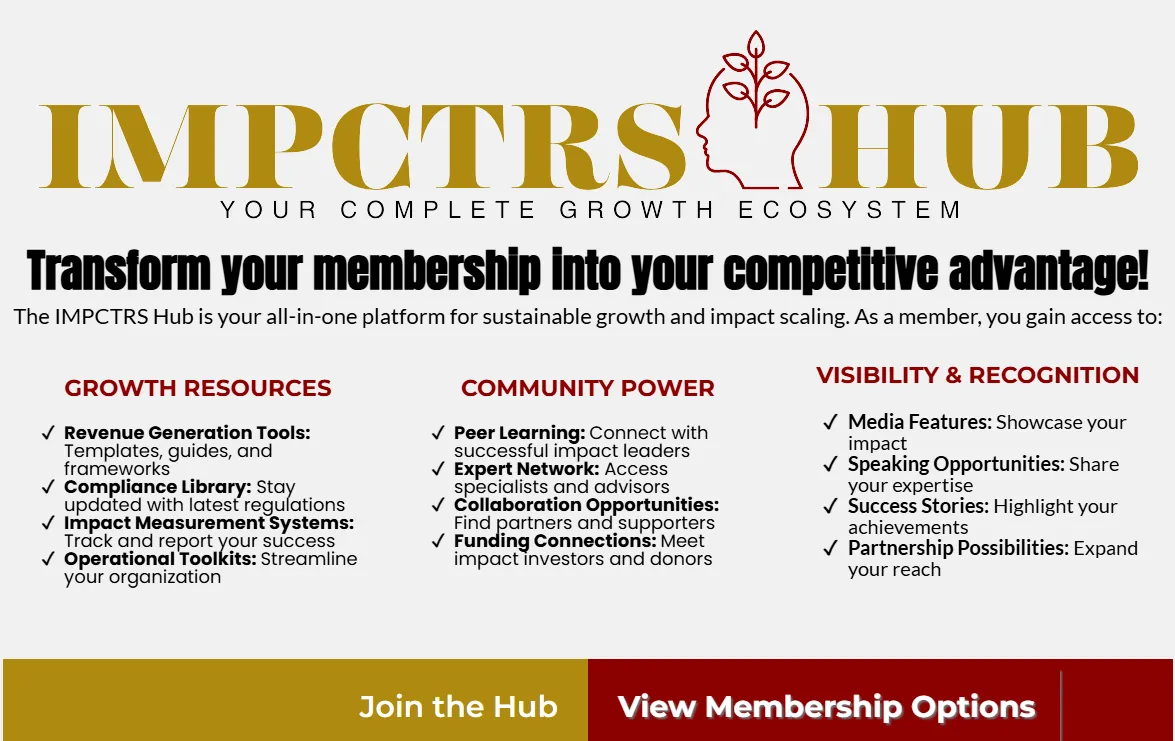See Our Latest Blogs
The Impctrs Management Group blog is where strategy meets action. We deliver powerful insights, practical strategies, and AI-driven solutions designed to help social impact businesses amplify their reach, fund their missions, and scale their operations sustainably. Every article is crafted to equip you with the knowledge and tools to lead with purpose and grow with confidence.

Social Entrepreneurship: Where Business Meets Impact
"Social entrepreneurship isn't simply about blending profit with purpose—it's about redesigning business as a catalyst for the change we desperately need to see in the world." — Tracy V. Allen
What Is a Social Entrepreneur?
Social entrepreneurship represents the powerful intersection of business acumen and social consciousness—a revolutionary approach that harnesses market principles to address pressing societal challenges. Unlike traditional entrepreneurship, which primarily focuses on profit maximization, social entrepreneurship embeds philanthropic causes and social missions directly into the business model and operational DNA.
Social entrepreneurs are visionary changemakers who recognize that commercial activities can—and should—generate positive social outcomes alongside financial returns. They reject the false dichotomy between doing good and doing well, instead pioneering innovative business solutions that deliberately target social or environmental problems as a core purpose rather than an afterthought.
The rise of social entrepreneurship reflects a profound shift in our collective understanding of business's role in society. As consumers increasingly demand ethical practices and meaningful impact from the companies they support, social entrepreneurs are leading the way in demonstrating that economic success and social benefit need not be mutually exclusive pursuits.
The Evolution and Growth of Social Entrepreneurship
While the practice of combining business with social purpose has historical precedents, social entrepreneurship as a recognized discipline gained significant momentum in the late 20th century. Organizations like Ashoka, founded in 1980, began systematically identifying and supporting individuals with innovative solutions to social problems. The term "social entrepreneur" entered mainstream consciousness largely through the work of Bill Drayton, Ashoka's founder, who championed the idea that entrepreneurial approaches could create systemic social change.
In recent decades, social entrepreneurship has experienced explosive growth across both developed and developing economies. Multiple factors have accelerated this expansion:
Digital connectivity enabling social entrepreneurs to reach global markets and stakeholders
Shifting consumer preferences toward socially responsible products and services
The emergence of impact investing providing new capital sources for social ventures
Growing awareness of pressing global challenges requiring innovative solutions
Increasing recognition that traditional charity models alone cannot solve complex social problems
Today, social entrepreneurship represents a significant economic force. According to the Global Entrepreneurship Monitor, approximately one in three startups worldwide now incorporates social or environmental goals alongside financial objectives. Business schools increasingly offer specialized programs in social entrepreneurship, and major corporations are adopting elements of social entrepreneurship principles in response to market demands.
Distinguishing Characteristics of Social Entrepreneurs
Social entrepreneurs share several distinctive characteristics that set them apart from both traditional business entrepreneurs and conventional nonprofit leaders:
Mission Primacy
While financial sustainability remains essential, the primary measure of success for social entrepreneurs is their impact on the social or environmental issue they target. This impact-first orientation informs all strategic decisions.
Systemic Approach
Rather than addressing symptoms of problems, social entrepreneurs typically aim to transform underlying systems that perpetuate social challenges. They seek to create lasting change through scalable solutions.
Resource Leverage
Social entrepreneurs skillfully deploy limited resources for maximum impact, often creating innovative funding models that blend earned income, investment capital, and philanthropic support.
Cross-Sector Collaboration
Most social entrepreneurs work effectively across traditional boundaries between business, government, and nonprofit sectors, creating hybrid approaches and partnerships.
Innovation Orientation
Social entrepreneurs consistently challenge conventional wisdom and develop novel approaches to persistent problems, often adapting business principles to contexts where they haven't previously been applied.
Stakeholder Accountability
Unlike businesses accountable primarily to shareholders, social enterprises maintain accountability to a broader spectrum of stakeholders, including beneficiaries, communities, and mission-aligned partners.
Types of Social Entrepreneurship Models
Social entrepreneurship encompasses diverse organizational models, each with distinctive structures and approaches to blending mission and market:
Co-operative Enterprises
These democratically owned and controlled businesses operate for the mutual benefit of their members, who may be employees, customers, or community stakeholders. Co-operatives apply business strategies to meet shared needs rather than maximize investor returns.
Examples:
Credit unions providing financial services to underserved communities
Agricultural co-ops helping small farmers access markets
Housing co-operatives creating affordable living options
Worker-owned businesses sharing profits equitably
Socially Responsible Businesses
These traditional companies integrate social and environmental considerations throughout their operations and value chains. Their commitment to responsible practices influences everything from sourcing to human resources to environmental impact.
Key Characteristics:
Rigorous ethical standards across operations
Sustainable supply chain management
Progressive employment practices
Environmental stewardship beyond compliance
Stakeholder rather than shareholder primacy
Social Purpose Businesses
Founded specifically to address particular social or environmental challenges, these businesses derive both their identity and competitive advantage from their mission focus. The business model is engineered to directly advance the social mission.
Distinctive Features:
Mission and market strategies are intrinsically aligned
Success metrics include both financial and impact indicators
Business activities directly generate social outcomes
Profit viewed as means to scaling impact rather than as primary goal
Nonprofit Social Enterprises
These tax-exempt organizations apply commercial strategies to maximize their impact. They generate earned income through business activities, but reinvest all profits into their charitable mission rather than distributing to owners.
Common Approaches:
Revenue-generating programs supporting nonprofit services
Training businesses employing program participants
Retail operations funding charitable work
Fee-for-service models sustaining free services for those in need
Social Firms
Specifically designed to create quality employment for people facing significant barriers to workforce participation, these businesses adapt their operations to accommodate and support individuals with disabilities or other disadvantages.
Core Elements:
Integrated workforce of disadvantaged and non-disadvantaged employees
Market-competitive products or services
Workplace accommodations and supportive employment practices
Business model designed around employee capabilities and needs
For-Profit Social Ventures
These businesses prioritize profitability while integrating significant social or environmental commitments. They may donate portions of profits, implement impact-oriented business practices, or embed giving models directly into their value proposition.
Typical Strategies:
Buy-one-give-one models (purchases trigger donations)
Percentage-of-profit donation commitments
Cause marketing partnerships with nonprofits
Environmentally regenerative practices
Notable Examples of Social Enterprises Making an Impact
Successful social enterprises demonstrate the diverse approaches to combining business success with meaningful societal impact:
TOMS Shoes
Pioneer of the "One for One" business model, TOMS gives a pair of shoes to a child in need for every pair purchased. The company has since expanded its impact model to include sight restoration, safe water access, and birth services through partnerships with humanitarian organizations, demonstrating how giving can be systematically integrated into business operations.
Lush Cosmetics
This ethical beauty brand has built its business model around environmental consciousness and ethical sourcing. Beyond creating "naked" (packaging-free) products, Lush demonstrates active environmental stewardship through its Charity Pot program, which has donated over $33 million to grassroots organizations working on animal protection, human rights, and environmental justice.
Grameen Bank
Founded by Nobel Prize winner Muhammad Yunus, Grameen Bank revolutionized financial inclusion by providing microloans to entrepreneurs in poverty, primarily women in rural Bangladesh. The bank's innovative approach to collateral-free lending created a financially sustainable model for poverty alleviation that has been replicated globally.
Patagonia
This outdoor clothing company exemplifies environmental activism through business. Besides using sustainable materials and responsible manufacturing, Patagonia donates 1% of sales to environmental causes through its "1% for the Planet" initiative. The company demonstrates how businesses can advocate for policy change while succeeding commercially.
Aravind Eye Hospital
Starting as a small 11-bed hospital in India, Aravind developed a revolutionary healthcare model providing world-class eye care to all—regardless of ability to pay—while maintaining financial sustainability. By performing high volumes of surgeries with exceptional efficiency, the paying patients subsidize free care for those in poverty, demonstrating healthcare innovation through business principles.
GoodWeave International
This international nonprofit organization works to stop child labor in global supply chains through a market-based certification program. By certifying child-labor-free rugs and home textile products, GoodWeave creates market incentives for ethical production while funding educational programs for children in weaving communities.
The Impact Spectrum: From Corporate Social Responsibility to Pure Social Enterprise
Social entrepreneurship exists along a continuum of impact commitment. Understanding this spectrum helps clarify the diverse approaches organizations take to blending purpose with profit:
Corporate Social Responsibility (CSR)
At one end of the spectrum, traditional businesses engage in socially responsible activities separate from their core business operations. While these initiatives create value, they typically remain peripheral to the company's central purpose and strategy.
Shared Value Creation
Moving toward greater integration, shared value approaches align social impact with business strategy. Companies identify opportunities where addressing social problems can create competitive advantage or open new markets.
Benefit Corporations
These for-profit entities legally commit to creating public benefit and sustainable value alongside shareholder returns. They integrate stakeholder interests into their governance structure and maintain higher accountability standards than conventional corporations.
Social Enterprise
Organizations specifically designed to address social or environmental challenges through commercial activities represent the heart of social entrepreneurship. Their business models intrinsically generate both financial sustainability and mission impact.
Nonprofits with Earned Income
Traditional charitable organizations increasingly incorporate earned income strategies to reduce donation dependency and increase sustainability. These hybrid approaches blend philanthropic funding with commercial revenue streams.
Challenges and Critical Success Factors for Social Entrepreneurs
While social entrepreneurship offers tremendous potential for addressing complex challenges, these ventures face distinct obstacles requiring specific strategies for success:
The Dual Bottom Line Challenge
Simultaneously pursuing financial sustainability and social impact creates inherent tensions in decision-making. Successful social entrepreneurs develop clear frameworks for making trade-offs when financial and impact objectives conflict.
Access to Appropriate Capital
Social enterprises often struggle to access financing that aligns with their hybrid models. Neither traditional philanthropic funding nor conventional investment capital may perfectly fit their needs. Creative funding approaches including impact investing, patient capital, and blended finance models help address this challenge.
Impact Measurement Complexity
Demonstrating both social and financial returns presents significant methodological challenges. Effective social entrepreneurs invest in robust impact measurement systems, using appropriate metrics and evaluation approaches aligned with their theory of change.
Talent Acquisition and Retention
Attracting employees with both business acumen and social commitment can be difficult, particularly given the often lower compensation compared to conventional businesses. Successful social enterprises cultivate strong mission-aligned cultures and create meaningful professional development pathways.
Scaling Challenges
Many social enterprise models prove difficult to scale due to their dependence on local conditions or founder-specific capabilities. Strategic approaches to scaling—including franchising, partnerships, and technology leverage—help overcome these limitations.
Starting Your Journey as a Social Entrepreneur
If you feel called to the social entrepreneurship path, consider these essential steps to begin your journey:
Identify a Meaningful Problem: Focus on issues where you have personal connection, relevant expertise, or unique insight. The most successful social enterprises address problems their founders deeply understand.
Develop a Viable Business Model: Create a sustainable approach to generating revenue while delivering social impact. Test your assumptions about both customer value and social outcomes before scaling.
Build a Supportive Ecosystem: Connect with mentors, partners, and networks in the social enterprise space. Organizations like Ashoka, the Skoll Foundation, and Echoing Green provide valuable resources for early-stage social entrepreneurs.
Secure Appropriate Financing: Identify funding sources aligned with your vision and stage of development. Consider innovative approaches like crowdfunding, impact investing, and blended capital.
Establish Impact Metrics: Determine how you'll measure and communicate your social impact. Clear metrics help guide strategic decisions and demonstrate value to stakeholders.
The Future of Social Entrepreneurship
Social entrepreneurship represents a profound reimagining of business's role in creating a more equitable and sustainable world. As traditional boundaries between sectors continue to blur, we can expect social entrepreneurship principles to increasingly influence mainstream business practice and policy development.
The most successful social entrepreneurs understand that profit and purpose need not be competing priorities but can instead be mutually reinforcing drivers of value creation. By harnessing market forces to address pressing challenges, they demonstrate that business can be a powerful force for positive change.
Whether you're an aspiring entrepreneur, an existing business owner, or simply a conscious consumer, the social entrepreneurship movement offers inspiring models for creating meaningful impact through commercial activity. The question is no longer whether business should contribute to social good, but how we can most effectively design enterprises that generate both financial returns and societal benefits.




Transform your membership into your competitive advantage!
The IMPCTRS Hub is your all-in-one platform for sustainable growth and impact scaling. As a member, you gain access to:
GROWTH RESOURCES
Revenue Generation Tools: Templates, guides, and frameworks
Compliance Library: Stay updated with latest regulations
Impact Measurement Systems: Track and report your success
Operational Toolkits: Streamline your organization
COMMUNITY POWER
Peer Learning: Connect with successful impact leaders
Expert Network: Access specialists and advisors
Collaboration Opportunities: Find partners and supporters
Funding Connections: Meet impact investors and donors
VISIBILITY & RECOGNITION
Media Features: Showcase your impact
Speaking Opportunities: Share your expertise
Success Stories: Highlight your achievements
Partnership Possibilities: Expand your reach
SUCCESS STORIES
LISA, a small business owner who hit her first big revenue goal last year. While she was thrilled with the immediate results, her business hit a plateau shortly after. After working with us, Lisa realized that while she was celebrating profits, she wasn’t reinvesting them wisely. She developed a reinvestment plan that focused on upgrading her marketing strategy and improving customer retention systems. Within a few months, her business not only broke through the plateau but began generating consistent, long-term profits.
MIKE, a digital marketing consultant who was spending hours each week managing his social media and handling client billing. He knew these tasks weren’t his strengths, but he thought doing them himself would save money. After burning out, Mike decided to outsource both areas. The result? His business became more streamlined, he regained hours each week to focus on client strategy, and his overall revenue increased by 20% within six months. The key wasn’t working harder—it was outsourcing smarter.
SARAH, one of our clients. She started out with a brilliant idea for an online course but struggled to launch it because she didn’t feel “expert enough.” After working with us, she faced her impostor syndrome head-on. We helped her focus on her strengths, refine her course, and launch with confidence. Within six months, she not only filled her course but also started attracting speaking engagements—all because she chose to move forward despite her doubts.
WHY CHOOSE
Proven Expertise:
• Successfully guided 100+ organizations
Compliance Focus:
• Keep your status while growing revenue
Comprehensive Support:
• Strategy through implementation
Community Power:
• Access to vast impact network
IMG: Where Purpose Meets Prosperity
JOIN OUR MAILING LIST
I agree to subscribed to your mailing list.

Contact Us
Ready to transform your impact into sustainable revenue?
GET STARTED TODAY!
General Inquiry: [email protected]
Strategic Inquiries: [email protected]
IMPCTRS Hub: [email protected]
Speaking & Training: [email protected]
BUSINESS HOURS:
Monday -Thursday
9:00 AM- 5:00 PM EST
Phone: 888-429-5094
Address: 830 N John Young Parkway
Kissimmee, FL 34741

